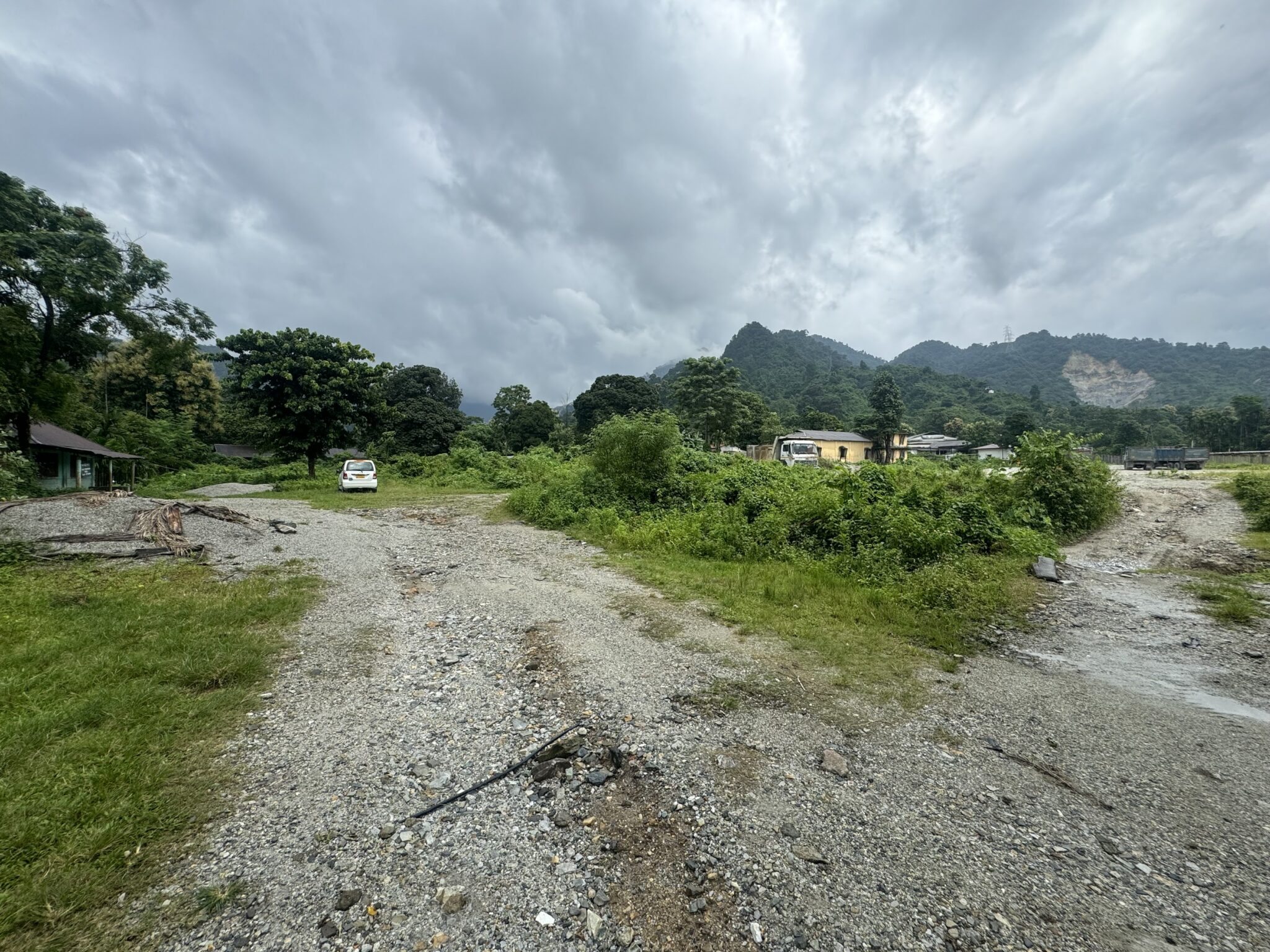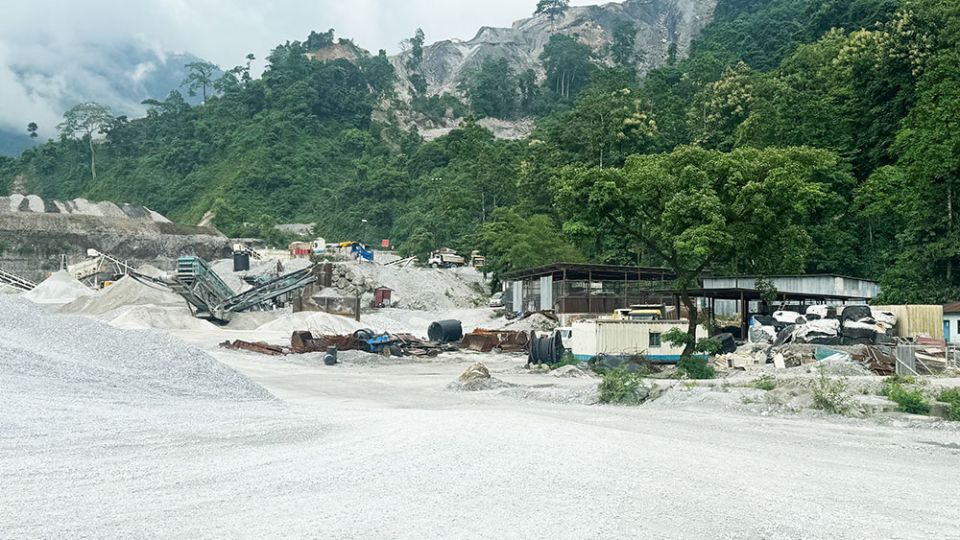October 8, 2024
SAMTSE – The seven local communities living in the mineral-rich areas of Phuentshopelri gewog, Samtse are crying foul over how the mining operations in the area are causing more harm than good, calling for a fair share of benefits.
Currently, four mining companies operate in Nyoenpaling-Tingtingma chiwog of Phuentshopelri gewog: Penden Cement Authority (PCAL) at Satergang, State Mining Corporation Limited (SMCL) at Neygang and Nyoenpaling, Lhaki Cement at Tingtingma, and Dendup Mines and Minerals at Gaden village.
Local residents feel neglected, with poor road infrastructure, such as the deteriorating road from Gomtu to Neygang, which makes commuting difficult. “We struggle to transport sick people to the hospital during emergencies,” said Aim Maya from Nyoenpaling B. “If it rains, we cannot reach Gomtu and have to reroute through India.”
Nyoenpaling-Tingtingma Tshogpa Prem Bahadur Yakha said that the old village road needs maintenance and restoration for convenience and sustainability, which will benefit both local communities and mining companies.
The lack of a bridge over the Pugli River creates additional challenges, particularly during the monsoon season, heightening flood risks for residents. The survey is complete, but budget constraints have delayed the project.
The chiwog has around 650 residents in 170 households.
Environmental and health concerns
Residents are increasingly worried about the environmental impacts of mining, particularly concerning water availability. A critical water source about two kilometres from the SMCL mining site has begun to dry up, putting pressure on safe drinking water availability.
The gewog administration plans to implement borewell water systems in the current plan.
A resident said that mining activities upstream often damage the water pipes, even though the mining company helps with maintenance. “I pay Nu 500 a week for water delivery, plus an additional Nu 300 a month to the caretaker,” she added.
The health implications of dust pollution are also significant.
Sancha Maya Rai, who runs a grocery shop in Nyoenpaling B below the SMCL mining road said that the dust worsens during winter, exacerbating health risks. “We have reported this to the gewog office several times, but nothing has been done,” she said.
Another resident, for instance, said that a paralyzed man living next to the road had to move to the village after eight years due to his deteriorating health condition.
Dust pollution also makes vegetable cultivation difficult. “We have tried growing vegetables,
but the growth and quality are poor, so we only grow areca nuts,” said Aim Maya.
The 2024 performance audit report has pointed out environmental non-compliance and pollution management failures at mining sites. However, the Department of Environment and Climate Change (DECC) did not respond to Kuensel’s inquiry about the impact of mining on local soil, water, and air.
Inadequate benefits and development
According to the Corporate Social Responsibility (CSR) framework under the Mines and Minerals Management Regulations 2022, mining companies are expected to contribute to community development, environmental protection, and local economies through social initiatives and infrastructure.
The SMCL is constructing a choeten in Nyoenpaling (Pugli) to engage the elderly meaningfully, and the community’s request for the construction of a bridge is also being considered, according to the SMCL management. The company spent Nu 2.61 million on CSR in 2023.
The PCAL provides regular transportation services for school-going children, a tuition programme for classes X and XII, and two medical personnel at Gomtu hospital as part of its CSR initiatives, including development community amenities and emergency services,
Contributions also include monetary donations and material support, such as cement and AAC eco-blocks for local schools, hospitals, police, and religious ceremonies. A lam and eight gelongs are being paid to facilitate religious activities in the gewog.
The PCAL management said that the company has undertaken and continues to engage in several CSR initiatives to support the affected communities. “We remain committed to making meaningful contributions to the well-being of these communities.”
However, local leaders said that affected communities at the mining sites have not benefited significantly from CSR initiatives. While acknowledging the support provided in Gomtu town, a local government leader said, “These benefits go to their employees and other government and corporate employees in the town, not to the affected villages.”
Without riverbank protection along the Pugli River, summer brings fear to downstream residents of Nyoenpaling. “We are vulnerable to flood risks,” said Bishnu Tamang, recalling a devastating flood in the 1990s.
Phuentshopelri Gup Robat Lepcha acknowledged that while mining companies have minimised blasting activities, the effects of heavy machinery and ground vibrations continue to pose risks, unless fully halted.
Despite CSR mandates requiring mining operators to prioritise local employment and skills development, many residents claim they are unaware of job opportunities or feel that the hiring process lacks fairness.
Gup Robat Lepcha acknowledged that local residents have expressed their grievances about the lack of employment opportunities. “I informed them that selection would be based on merit, as SMCL is a government company,” he said.
Mine operators, however, disagree, claiming that unskilled jobs, such as daily wage work at SMCL, are mostly filled by local people. The PCAL has employed 149 residents from Nyoenpaling-Tingtingma chiwog.
The SMCL’s Chief Executive Officer, Kezang Jamtsho, said that local employees would have been retained during the transition if Jigme Mines had employed them.
The JMCL transferred the Chunaikhola Dolomite mines to SMCL in 2020, along with 246 staff, after 15 years of operation since winning the rights in 2005 with a Nu 390 million bid.
He added that minor construction works are awarded to local people at negotiated rates. “However, jobs requiring specific competencies cannot be reserved solely for locals, as that would not be fair to other Bhutanese.”
Kezang Jamtsho added that SMCL deploys local people and local resources to carry out its works. “We hire local trucks directly from individual owners without involving middlemen.”
The Phuentshopelri gewog administration confirmed receiving a letter from SMCL inquiring if residents were interested in using their trucks for transportation, but there was no interest due to the low rates.
A trucker said that transportation services have suffered due to lower rates after the SMCL takeover. “We used to get Nu 21 to Nu 23 per metric tonne but it has now been reduced to Nu 19 to Nu 21 per metric tonne,” he said.
SMCL CEO Kezang Jamtsho explained that hiring rates are based on tendered rates and are comparable across mining sites. “These rates are flexible, and adjust according to fuel prices, increasing if fuel prices rise by more than five percent and decreasing otherwise.”


Regulatory challenges
The Department of Geology and Mines (DGM) and DECC, under the Ministry of Energy and Natural Resources monitor the annual compliance of mines and quarries, as well as on a need basis, including during the environmental clearance renewal period for each project.
Given the inconsistencies with regulations in the Mines and Minerals Management Act of 1995, the DGM is reviewing the Mines and Minerals Bill 2020 to ensure sustainable resource extraction while maximising economic benefits and minimising environmental and community impacts.
“Owing to its potential to contribute to the socio-economic development of the country, the mining sector has been classified as one of the focus areas for investment even in the 13th Plan. True to this mandate, the department is facilitating mining leases for potential mineral deposits upon the fulfillment of techno-economic feasibility studies,” stated the DGM.
When asked about the evaluation of the effectiveness of CSR activities, the DGM stated that the assessment must be conducted jointly with the local government and relevant stakeholders.
In many developing countries, mining provides higher wages and promotes local employment through corporate training.
In the Philippines, the 1995 mining law allocates 40 percent of excise tax to local governments, imposes a real estate tax on mining companies, and mandates a one percent donation of operating costs for local development plans.
Mines and minerals are among the top 10 exports of the country. In 2023, Bhutan exported 4.32 million metric tonnes of minerals, led by dolomite at 2.90 million metric tonnes, compared to 3.51 million metric tonnes in 2022. The Gross Value Added from the mining sector rose to Nu 5.51 billion in 2023, up from Nu 4.08 billion in 2022.
Dolomite, marble, crystalline limestone, and construction materials are exported to India and Bangladesh, while gypsum is exported to India, Bangladesh, and Nepal.


